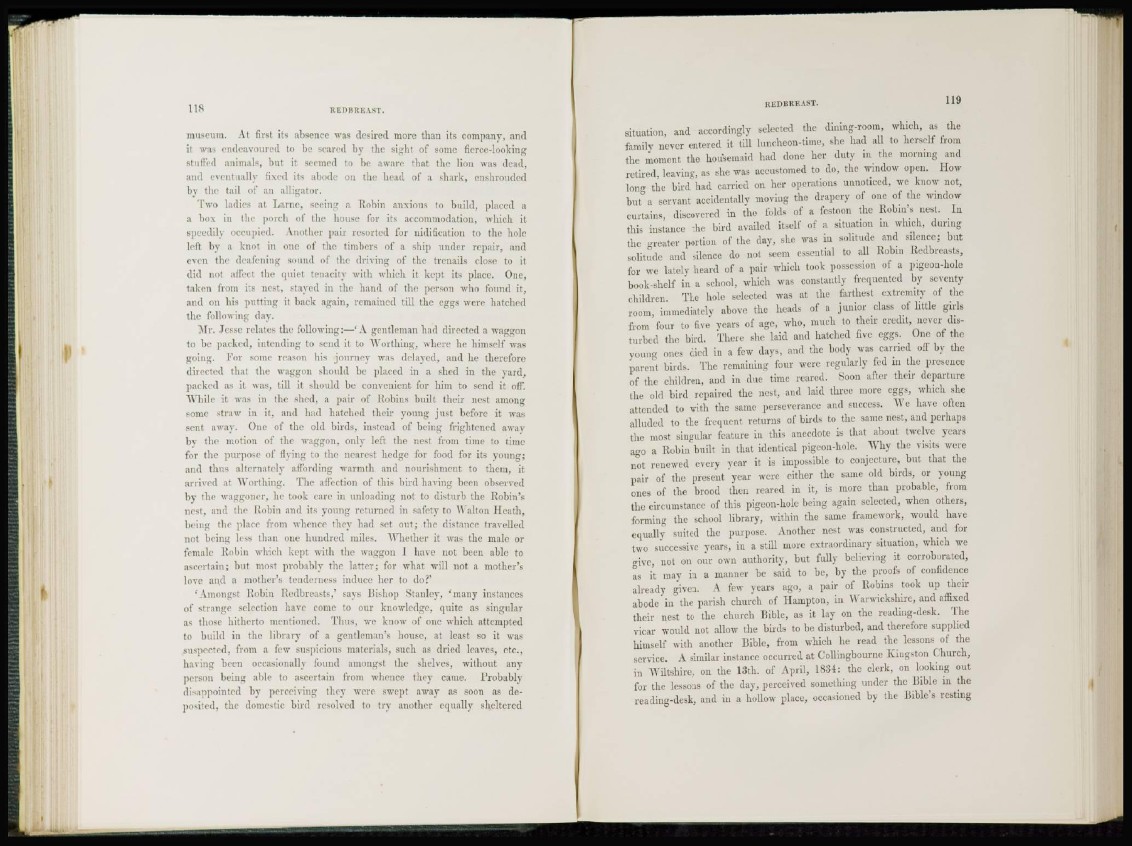
museum. At first its absence was desired more than its company, and
if was endeavoured to be scared by the sight of some fierce-looking
Btuffed animals, but it seemed to be aware that the lion was dead,
and eventually fixed its abode on the head of a shark, enshrouded
by the tail of an alligator.
Two ladies at Lame, seeing a Robin anxious to build, placed a
a box in the porch of (he house for its accommodation, which it
speedily occupied. Another pair resulted for nidification to the hole
left by a knot in one1 of the timbers of a ship under repair, and
even the deafening sound of the driving of the trenails close to it
did not affect the quiet tenacity with which it kept its place. One,
taken from its nest, stayed in the hand of the person who found it,
and on his putting it back again, remained till the eggs were hatched
the following day.
.Mr. Jesse relates the following:—'A gentleman had directed a waggon
to be packed, intending to send it to "Worthing, where he himself was
going. For some reason his journey was delayed, and he therefore
directed that the waggon should be placed in a shed in the yard,
packed as it was, till it should be convenient for him to send it off.
While it was in the shed, a pair of Robins built their nest among
some straw in it, and had hatched their young just before it was
sent away. One of the old birds, instead of being frightened away
by tin1 motion of the waggon, only left the nest from time to time
tor tin1 purpose of flying to the nearest hedge for food for its young;
and thus alternately affording warmth and nourishment to them, it
arrived at Worthing. The affection of this bird having been observed
by the waggoner, he took care in unloading not to disturb the Robin's
nest, and the Robin and its young returned in safety to Walton Heath,
being tin1 place from whence they had set out; the distance travelled
not being le>s than one hundred miles. Whether it was the male or
female Robin which kept with the waggon I have not been able to
ascertain; but most probably the latter; for what will not a mother's
love and a mother's tenderness induce her to do?'
'Amongst Robin Redbreasts," says Bishop Stanley, 'many instances
of strange selection have come to our knowledge, quite as singular
as those hitherto mentioned. Thus, we know of one which attempted
to build in the library of a gentleman's house, at least so it was
suspected, from a tew suspicious materials, such as dried leaves, etc.,
having been occasionally found amongst the shelves, without any
person being able to ascertain from whence they came. Probably
disappointed by perceiving they were swept away as soon as deposited,
the domcsl LC bird resolved to try another equally sheltered
situation, and accordingly selected the dining-room, which, as the
family never entered it tdl luncheon-time, she had all to herself from
the moment the housemaid had done her duty in the morning and
retired, leaving, as she was accustomed to do, the window open. How
long the bird had carried on her operations unnoticed, we know not,
but a servant accidentally moving the drapery of one of the window
curtains, discovered in the folds of a festoon the Robin's nest. In
this instance the bird availed itself of a situation in which, during
the greater portion of the day, she was in solitude and silence; but
solitude and silence do not seem essential to all Robin Redbreasts,
for we lately heard of a pair which took possession of a pigeon-hole
book-shelf in a school, which was constantly frequented by seventy
children. The hole selected was at the farthest extremity of the
room, immediately above the heads of a junior class of little girls
from four to five years of age, who, much to their credit, never disturbed
the bird. There she laid and hatched five eggs. One of the
young ones died in a few days, and the body was carried off by the
parent birds. The remaining four were regularly fed in the presence
of the children, and in due time reared. Soon after their departure
the old bird repaired the nest, and laid three more eggs, which she
attended to with the same perseverance and success. Wc have often
alluded to the frequent returns of birds to the same nest, and perhaps
the most singular feature in this anecdote is that about twelve years
ago a Robin built in that identical pigeon-hole. Why the visits were
not renewed every year it is impossible to conjecture, but that the
pair of the present year were either the same old birds, or young
ones of the brood then reared in it, is more than probable, from
the circumstance of this pigeon-hole being again selected, when others,
forming the school library, within the same framework, would have
equally suited the purpose. Another nest was constructed, and for
two successive years, in a still more extraordinary situation, which we
give, not on our own authority, but fully believing it corroborated,
as it may in a manner be said to be, by the proofs of confidence
already given. A few years ago, a pair of Robins took up their
abode in the parish church of Hampton, in Warwicksliirc, and affixed
their nest to the church Bible, as it lay on the reading-desk. The
vicar would not allow the birds to be disturbed, and therefore supplied
himself with another Bible, from which he read the lessons of the
service. A similar instance occurred at Collingbournc Kingston Church,
in Wiltshire, on the 13th. of April, 1834: the clerk, on looking out
for the lessons of the day, perceived something under the Bible in the
reading-desk, and in a hollow place, occasioned by the Bible's resting